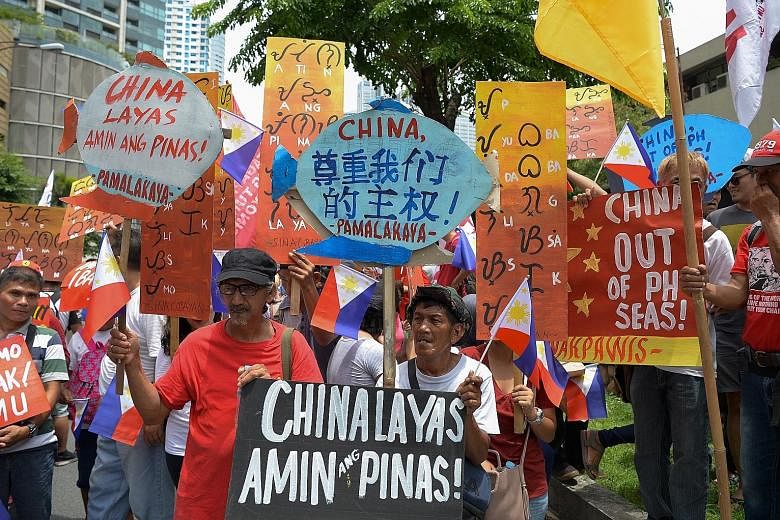The Philippines, Malaysia, Vietnam and Indonesia are likely to stay the course, despite the United States' "full-throated" backing of an international ruling dismissing China's claims to nearly all of the South China Sea.
"The great powers, as they escalate their rivalry, will woo us into their side. But we will advance our own national interest," Mr Harry Roque, spokesman for President Rodrigo Duterte, said yesterday.
He said while the Philippines stands by the 2016 ruling against China, "this is not the sum total of our relations… We will just have to agree to disagree". The Philippines is contesting China's claims over waters it considers part of its exclusive economic zone (EEZ).
China's vast claims also overlap with those of Vietnam, Malaysia, Brunei and Taiwan.
Foreign Secretary Teodoro Locsin yesterday held a video call with Chinese Foreign Minister Wang Yi.
Mr Wang noted that with the joint efforts of China and Asean countries, the situation in the South China Sea has generally remained stable. But, he said, the US "out of its own geopolitical needs, worries only if the South China Sea is not chaotic".
The US on Monday formally rejected China's claims to offshore resources in most of the South China Sea.
Malaysia is unlikely to "become very gung-ho and push forward and confront China", Universiti Malaya's Institute of China Studies director Ngeow Chow-Bing said.
"The US statement is a formal expression of what Washington has already been practising for years."
Hanoi-based analyst Ha Hoang Hop said he does not expect the US' stance to make any difference on the ground. "The US will continue to exercise limited Fonops (freedom of navigation operations) and possibly take other actions.
"Even though the risk of military conflict is higher, I expect China and the US to hedge these risks."
Indonesia, which is not a claimant state but has clashed with China over fishing rights around the northern islands of Natuna, said its position remains "firm and consistent". Foreign Affairs Ministry spokesman Teuku Faizasyah said: "Any country's support for Indonesia's rights concerning Natuna's waters is normal, as our position is based on Unclos." He was referring to the UN Convention on the Law of the Seas, which delineates EEZs that countries may claim.
The Philippines brought a case against China in The Hague in 2013, arguing that China's so-called nine-dash line that marks its claims to nearly all of the South China Sea runs against Unclos. The Hague tribunal sided with the Philippines in 2016, and dismissed China's claims.
US Secretary of State Mike Pompeo, invoking the 2016 ruling on Monday, sided with South-east Asian nations, after years of Washington saying it took no position on the merits of disputes between China and each of its South-east Asian neighbours. Still, some analysts say the US' latest involvement may just be a short-term bluster and not a permanent policy goal.
• Additional reporting by Shannon Teoh, Tan Hui Yee, Arlina Arshad, Linda Yulisman and Tan Dawn Wei

